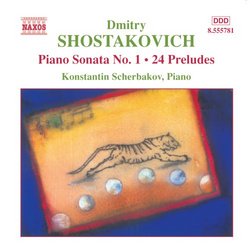| All Artists: Dmitry Shostakovich, Konstantin Scherbakov Title: Shostakovich: Piano Sonata No. 1; 24 Preludes Members Wishing: 0 Total Copies: 0 Label: Naxos Original Release Date: 1/1/2003 Re-Release Date: 10/21/2003 Genres: Dance & Electronic, Classical Styles: Chamber Music, Forms & Genres, Short Forms, Sonatas, Suites, Historical Periods, Classical (c.1770-1830), Modern, 20th, & 21st Century, Instruments, Keyboard Number of Discs: 1 SwapaCD Credits: 1 UPC: 747313578122 |
Search - Dmitry Shostakovich, Konstantin Scherbakov :: Shostakovich: Piano Sonata No. 1; 24 Preludes
 | Dmitry Shostakovich, Konstantin Scherbakov Shostakovich: Piano Sonata No. 1; 24 Preludes Genres: Dance & Electronic, Classical
|
Larger Image |
CD Details |
CD ReviewsShostakovich's Less-Familiar Piano Music, Very Well Played J Scott Morrison | Middlebury VT, USA | 12/17/2003 (5 out of 5 stars) "Konstantin Scherbakov seems to be becoming one of Naxos's house pianists, along with Idil Biret and Jeno Jando. Each of them is a superb artist, although each has had some weaker moments on disc. I was less than pleased with Scherbakov's performance of the Godowsky 'Passacaglia' (although, admittedly, that was on Naxos's sister label, Marco Polo). But he has given us wonderful Schubert/Liszt transcriptions, Liszt transcriptions of Beethoven symphonies and, more important for readers of this review, the large group of Shostakovich 'Preludes and Fugues, Op. 87.' The 'Preludes, Op. 34' are not to be confused with the much larger and more serious 'Preludes and Fugues.' They are altogether more light-hearted, in general, and briefer. And of course they don't have attached fugues. The 24 preludes are written, like Chopin's, in all the major and minor keys and follow the same succession of keys as Chopin's. I only know one other recording of this group--that by Olli Mustonen, coupled interestingly with similarly arranged preludes by Charles-Henri-Valentin Alkan--and side by side comparison gives the nod to Scherbakov.'Aphorisms, Op. 13' is a group of ten brief pieces written in 1927. They have intentionally ironic or inapt titles; e.g., the 'Nocturne' is more brash and sardonic than nocturnal. 'Nocturne' also makes use of a theme later quite often used by Shostakovich, the notes DSCH (German notation; in our notation those notes are D Eb C B). None of the Aphorisms lasts much longer than a minute.'Three Fantastic Dances, Op. 5,' the earliest set here, was written when Shostakovich was only sixteen and are not much heard these days, although I recall hearing them in recital back in the 1950s. They, too, are light-hearted and more like Prokofiev than anything else of his I can recall. The piquant Prokofievan harmonies are in evidence throughout. I suspect if someone heard them and didn't know the composer they would have a hard time placing them, or would think them to be light-hearted Prokofiev occasional pieces. The three of them last only a total of four minutes.The big piece here, although not in length--that distinction goes to the collection of preludes--is the First Piano Sonata, Op. 12. Still quite early in Shostakovich's output, it uses fairly radical methods, sounding much later than it actually is. In one movement constructed in three more or less discrete sections, it begins with a dissonant (actually, polytonal but with unequal emphasis on the key of C major) storm that rages with quartal and tritonal harmonies. A quieter, slower but no less unsettling section follows with a grotesque funeral march tread. Downward scale passages, set against a trudging bass, become contrapuntal and eventually the whole thing, via a dreamlike passage, grinds to a halt before gradually gathering steam again and building up to an insistent repetition of C-sharp against attempts to resolve into C major. This is a formally quite sophisticated composition that presages some of the techniques used much later in Shostakovich's symphonies (his 8th and 11th, say) and quartets (several of the later ones). Quite an accomplishment for the 20-year-old Shostakovich. And Scherbakov plays the socks off it.The recorded sound is warm and spacious. I've been very impressed with the sound of the piano in these Scherbakov/Naxos/Marco Polo discs. Further, Scherbakov is fast becoming one of my favorite pianists--his recent Rachmaninov 'Second Piano Sonata' is a treasure--and certainly one I'll be watching over the years to come. Recommended.Scott Morrison" A superb release G.D. | Norway | 04/13/2010 (5 out of 5 stars) "This is quite simply a superb release and one that once again shows that Konstantin Scherbakov is a pianist of world-class quality. That is not to say that his take on Shostakovich's piano music is the new gold standard or anything - I can easily imagine some listeners taking issue with his relatively mellow approach to the preludes op.34, playing up the mystery and magic rather than the grittiness. He is liberal with rubato and not always completely faithful to the score (in terms of dynamic markings), yet the end result is truly compelling and definitely recommended listening even if you think you prefer a tougher approach. The preludes are nicely contrasted with the rugged, obstinate and complex Aphorisms and the remarkable, early Fantastic Dances. Scherbakov's take on the first sonata is not mellow, however - here rhythmic incisiveness, flair and steely brilliance dominates in what is, I think, the most convincing performance of this gritty, dense work I can imagine. The sound quality is simply superb; crystal-clear and warm and capturing all the tonal nuances of the piano textures perfectly. Strongly recommended."
|

 Track Listings (38) - Disc #1
Track Listings (38) - Disc #1